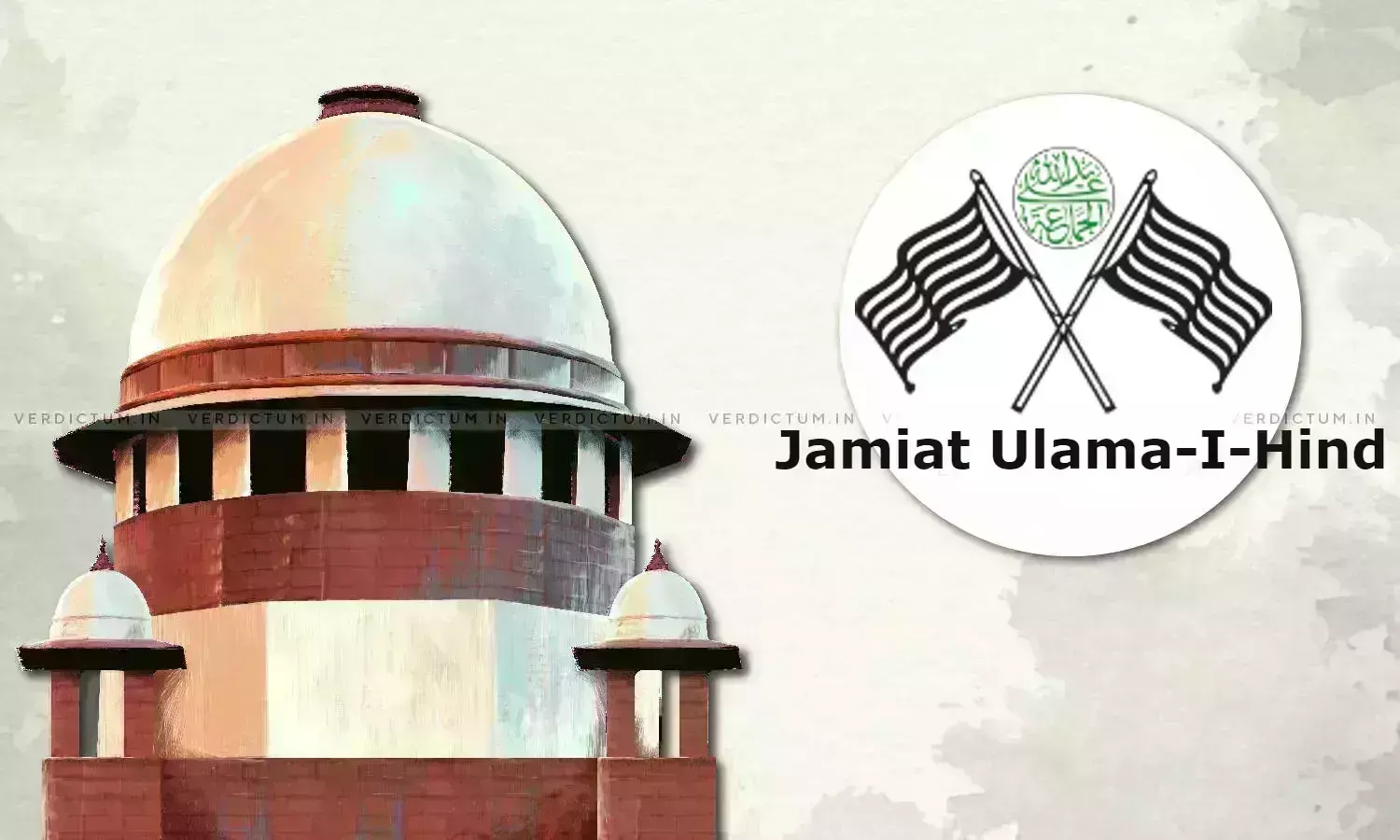
Undisputed Prohibition In Islam On Homosexuality, Same-Sex Couple Will Be "Non-Adherents": Jamiat Ulama-I-Hind Before Apex Court
 |
|In consensus with the central government's counter-affidavit opposing same-sex marriage, the Jamiat Ulama-i-Hind (acting through Maulana Mahmood Madan) has moved Supreme Court with an application seeking intervention in the batch of pleas before the Court seeking legalisation of same-sex marriages.
Opposing the batch of pleas, the Muslim religious body has stated that there would 'arise larger implications' if same-sex marriage is recognized by the Court. Their affidavit reads that the "concept of marriage is more than just the socio-legal recognition of a union of any two persons” and that "the recognition of marriage is on the basis of established and sustainable societal norms and shall not keep changing on the basis of variable notions based upon newly developed value system emerging from a different worldview in a different paradigm".
The Supreme Court of India is seized of a batch of petitions seeking recognition of same-sex marriages. The petitioners before the Court have sought that the right of citizens including LGBTQIA to marry a person should be of one’s choice irrespective of gender. The central government had argued that having a sexual relationship with same-sex individuals is not comparable to the Indian family unit concept.
In its application, the religious organization highlights the following aspects:
Non-availability of Statutory Provisions to Govern Same-Sex Marriage:
The affidavit reads that "We have numerous statutory provisions ensuring marriages between opposite sexes with related consequential legal provisions with various rights related to inheritance, succession, and, tax liabilities stemming from marriage. Hence, the concept of marriage between two opposite sexes is like basic feature‟ of the concept of marriage itself which leads to the creation of a bundle of rights". Further, it states under the garb of such prayers, the petitioners, seek to dilute the concept of marriage which is akin to a stable institution.
Other Countries Recognizing Same-Sex Marriages Have Reached Threshold of Literacy & Social Acceptance:
The religious organization submits that the countries that have recognized the concept of same-sex marriage have reached a certain level of threshold of social order in terms of education/literacy and societal acceptance. This logic that other countries have legalized the inclusion of same-sex relationships in the concept of marriage cannot be introduced in India. The plea also states that "it is also pertinent to mention that most Eastern countries do not recognize same-sex marriages" and that to accept the prayers based on the fact that in some parts of the world, this practice is legal; can be very harmful to the social order of the other part.
A Person is a Sinner, if they Fail to Follow Such Norms in the Religious Paradigm:
Stating that every organized religion is bound to have certain principles attached and that when a person enters into a religion or declares herself to be a follower of a religion that person is expected to have a belief in the foundational norms and that any demand contrary to it would be amending the religious norms. The affidavit calls the defining figures of Western sexual liberation movements 'nearly staunch atheists'.
Personal Laws Find Constitutional Protection:
It further reads that "prayers in the present Petition are in complete contravention of the established understanding of the concept of marriage in all personal laws i.e. between a biological man and a biological woman and thus intends rake up the very core i.e. the structure of a family unit in prevailing in the personal laws system". Relying on the judgement of Shayara Bano v. Union of India, (2017) 9 SCC 1 they state that personal law has constitutional protection. This protection is extended to Personal Law through Article 25 of the Constitution.
Marriage in the Indian Legal System Matter of Legislative Policy:
They submit that "that the legislative policy of a “marriage” in the Indian legal system, whether penal, constitutional, or personal, has been between a biological man and a biological woman. There are categorical and definitive binaries with the usage of terms such as “husband”, “wife”, “mother”, “father”, etc. Any deviation or dilution of such definitions is a matter of legislative policy based on social realities, acceptance and on extensive socio-legal research" Relying on the judgement of His Holiness Kesavananda Bharati Sripadagalvaru and Ors. v. State of Kerala and Anr. [(1973) 4 SCC 225, the organization submits that it is for the legislature, in its legislative wisdom, to enact laws as per the societal acceptability based on the prevailing values of a society.
The petitions concerning same-sex marriage are listed before the Constitution bench for consideration on April 18, 2023. The intervention application has been filed by Advocate M.R. Shamshad.
On the last hearing, the Court ordered that the batch of petitions be heard by a five-judge Constitution Bench.
Recently, twenty-one retired judges of various High Courts have issued a common statement against legalisation of same-sex marriage, saying that it will be a death knell to the already crumbling family system and will have a devastating impact on society.
Case Title: Supriyo @ Supriya Chakraborty & Anr. v. Union Of India